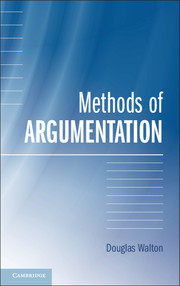Book contents
- Frontmatter
- Contents
- Acknowledgments
- 1 Introducing Some Basic Concepts and Tools
- 2 Argument Attack, Rebuttal, Refutation and Defeat
- 3 Arguments with Missing Parts
- 4 Applying Argumentation Schemes
- 5 Similarity, Precedent and Argument from Analogy
- 6 Teleological Argumentation to and from Motives
- 7 The Carneades Model of Scientific Discovery and Inquiry
- 8 Fallacies, Heuristics and Sophistical Tactics
- 9 The Straw Man Fallacy
- Bibliography
- Index
1 - Introducing Some Basic Concepts and Tools
Published online by Cambridge University Press: 05 June 2014
- Frontmatter
- Contents
- Acknowledgments
- 1 Introducing Some Basic Concepts and Tools
- 2 Argument Attack, Rebuttal, Refutation and Defeat
- 3 Arguments with Missing Parts
- 4 Applying Argumentation Schemes
- 5 Similarity, Precedent and Argument from Analogy
- 6 Teleological Argumentation to and from Motives
- 7 The Carneades Model of Scientific Discovery and Inquiry
- 8 Fallacies, Heuristics and Sophistical Tactics
- 9 The Straw Man Fallacy
- Bibliography
- Index
Summary
Argumentation, which can be abstractly defined as the interaction of different arguments for and against some conclusion, is an important skill to learn for everyday life, law, science, politics and business. It is a rich, interdisciplinary area of research straddling philosophy, communication studies, linguistics, psychology and artificial intelligence that has developed context-sensitive practical methods to help a user identify, analyze and evaluate arguments.
Recently, the field of computing has embraced argumentation as a paradigm for research in artificial intelligence and multi-agent systems. Artificial intelligence in particular has seen a prolific growth in uses of argumentation. Argumentation has proved helpful to computing because it has provided concepts and methods used to build software tools for designing, implementing and analyzing sophisticated forms of reasoning and interaction among rational agents (Reed and Grasso, 2007). Recent successes include argumentation-based models of evidential relations and legal processes of examination and evaluation of evidence. Argument mapping has proved to be a useful tool for designing better products and services and for improving the quality of communication in social media by making deliberation dialogues more efficient. There now exist formal systems of argumentation to model many aspects of reasoning and argument that were formerly studied only by less structured methods of informal logic.
- Type
- Chapter
- Information
- Methods of Argumentation , pp. 1 - 26Publisher: Cambridge University PressPrint publication year: 2013



